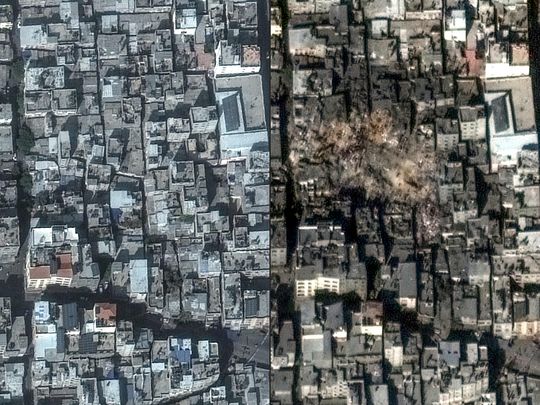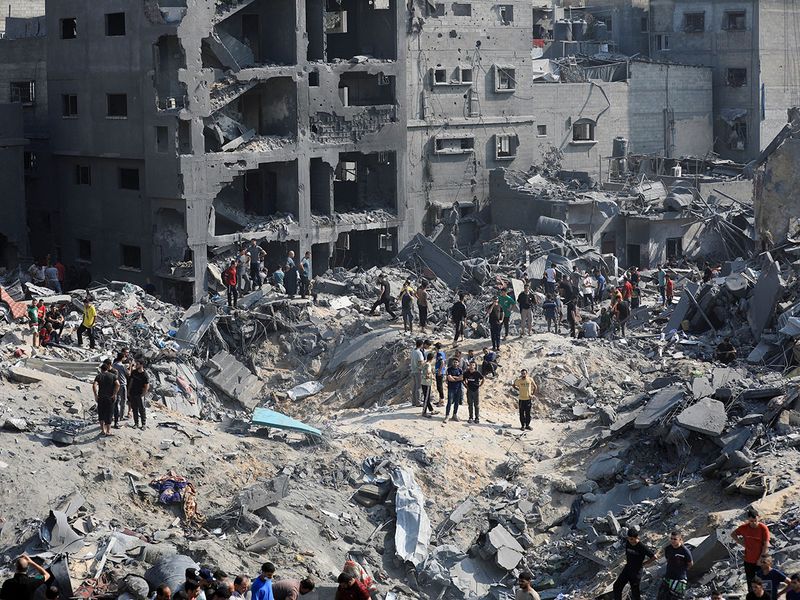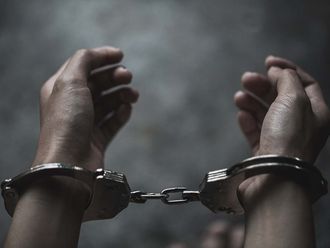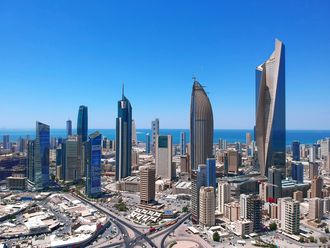
Gaza/Jerusalem: More foreign nationals prepared to leave the besieged Gaza Strip on Thursday as the enclave's Hamas-run government said at least 195 Palestinians died in Israel's attacks on the Jabalia refugee camp, strikes that UN human rights officials said could be war crimes.
At least 320 foreign citizens on an initial list of 500, as well as dozens of severely injured Gazans, crossed into Egypt on Wednesday under a deal among Israel, Egypt and Hamas.
Passport holders from Australia, Austria, Bulgaria, the Czech Republic, Finland, Indonesia, Italy, Japan, Jordan, the United Kingdom and the United States were in the evacuation.
Gaza border officials said the border crossing would reopen on Thursday so more foreigners could exit. A diplomatic source said some 7,500 foreign passport holders would leave Gaza over about two weeks.
read more on Israel-Hamas war
- Biden calls for humanitarian 'pause' in Israel-Hamas war
- Israeli strikes on Gaza refugee camp could be war crimes: UN
- 1000 Palestinian children from Gaza to be treated at UAE hospitals
- Israel-Gaza war: Hamas says seven hostages killed in Jabaliya refugee camp bombing
- Israel-Gaza war: Hamas hostage videos are 'cruel, manipulative, revealing'. Experts expect more.
Pressing an offensive against Hamas militants, Israel has bombed Gaza by land, sea and air in its campaign to wipe out the Islamist group after its cross-border rampage into southern Israel on October 7. Israel said Hamas killed 1,400 people, mostly civilians, and took more than 200 hostages.
The Gaza health ministry says at least 8,796 Palestinians in the narrow coastal enclave, including 3,648 children, have been killed by Israeli strikes since October 7.
Loud explosions were heard in the early hours of Thursday around the Al Quds hospital in densely populated Gaza City, the Palestinian Red Crescent said. Israeli authorities have previously warned the hospital to evacuate immediately, which UN officials have said is impossible to do without endangering patients.
Two Hamas commanders killed, says Israel
Israel said its strikes on Tuesday and Wednesday killed two Hamas military leaders in Jabalia, Gaza's biggest refugee camp.
Israel said the group had command centres and other "terror infrastructure under, around and within civilian buildings, intentionally endangering Gazan civilians." Gaza's Hamas-run government media office said on Thursday that at least 195 Palestinians were killed in the two Israeli attacks on Jabalia, with 120 still missing under the rubble. At least 777 more were wounded, it said in a statement.
Palestinians on Wednesday sifted through rubble in a desperate hunt for trapped victims. "It is a massacre," said one witness.

United Nations human rights officials said strikes on the camp could be a war crime.
"Given the high number of civilian casualties & the scale of destruction following Israeli air strikes on Jabalia refugee camp, we have serious concerns that these are disproportionate attacks that could amount to war crimes," the UN High Commissioner for Human Rights wrote on social media site X.
Amid growing international calls for a humanitarian pause in hostilities, conditions in the seaside enclave are increasingly desperate under Israel's assault and tightened blockade. Food, fuel, drinking water and medicine have run short.
Dr. Fathi Abu Al Hassan, a US passport holder waiting to cross into Egypt on Wednesday, described hellish conditions inside Gaza without water, food or shelter.
"We open our eyes on dead people and we close our eyes on dead people," he said.
Hospitals have struggled as shortages of fuel forced shutdowns including Gaza's only cancer hospital. Israel has refused to let humanitarian convoys bring in fuel, citing concern that Hamas fighters would divert it for military purposes.
Ashraf Al Qudra, a spokesman for the Gaza health ministry, said in a televised news conference on Thursday that the main power generator at the Indonesian Hospital was no longer functioning due to lack of fuel.
The hospital was switching to a back-up generator but would no longer be able to power mortuary refrigerators and oxygen generators. "If we don't get fuel in the next few days, we will inevitably reach a disaster," he said.
Blinken will also stop in Jordan, one of a handful of Arab states to have normalised relations with Israel. On Wednesday Jordan withdrew its ambassador from Tel Aviv until Israel ends its assault on Gaza. Israel said it regretted Jordan's decision.
In Jordan, Blinken will underscore the importance of protecting civilian lives and reiterate a US commitment to ensure Palestinians are not forcibly displaced from Gaza, a growing concern of the Arab world, Miller said.
He will pursue talks led by Egypt and Qatar on securing the release of all of the hostages held by Hamas, Miller said.








